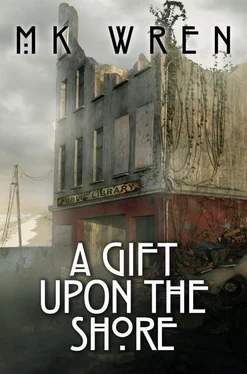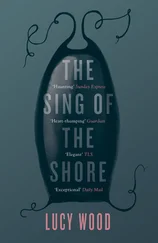His breath catches at the word morphine , but he says nothing, and I go on. “Actually it was an easy labor and only lasted about eight hours. Toward the end I squatted on the floor as women have since—well, probably since before we were homo sapiens. All through my labor, I kept telling myself a child bom only a month prematurely could live. I knew it would be touch and go, but…”
I remember with mordant clarity the culmination of labor, remember squatting naked in that warm room in candlelight, remember the overwhelming urge to bear down, to force the baby into the world, whatever the cost in pain, remember the exultant emotional surge that accompanied it. And finally the baby’s head appeared, then its body came out into my hands….
It was perfect, my child, gauzed with a creamy coating, still covered with fine, silky hair. It would have lost that in the last month. Incomplete, yet still perfect. And so small. It couldn’t have weighed more than four pounds, and it filled my two hands easily. The umbilical cord was twisted like a slick rope around its right arm, and the tiny hand seemed to grasp it. The tiny, perfect, lifeless hand.
Poor little creature, what agonies did you endure? And your mother was oblivious, never guessing your death throes, helpless to offer succor even if she had known you were dying ….
“It never occurred to me, Stephen, even at the beginning of my labor, that the child… was already dead.”
His eyes close, but he isn’t surprised. Unlike Jerry, he had no reason to believe my child had lived.
But at the time of its birth I had no reason to believe it had died.
And I remember holding that mote of failed life and crying out with the clawing agony of this new grief, remember my cries echoing on nothing. That was what was left to me. Nothing . I had at that moment tested the depths of desolation, and I would never sink deeper.
Stephen’s voice reaches through to me. “Oh, Mary, I’m so sorry.”
My eyes are hot with tears, and it takes me a moment to realize I’ve been remembering a grief thirty years old. “Thank you, Stephen.”
“The baby—was it a boy or a girl?”
Why is that always the first question asked about a newborn child? But what else can one ask? What is more essential to its identity at that point—except, is it alive or dead?
“It was a boy.”
“Oh.” That comes out on a sigh, as if the fact that the child was male made its death even more of a loss. But Stephen is the product of a patriarchal society, although his attitudes, shaped by the necessities of his isolated life, are less rigid than those of his predecessors. I’ve often wondered what human history might have been if men had never discovered the connection between copulation and conception.
For a long time Stephen is silent, studying me, and at length he says, “I don’t know how you kept going after that.”
I look seaward, remember the second pyre I built, a smaller one for the child I never named. “I’m not sure how I did, either, Stephen, and a great deal of the next year is lost to me. But ultimately… I suppose I felt a duty to go on living. For one thing, there were the animals to consider. Mostly, there were the books. I had to finish what Rachel had begun. And time does heal grief. Finally. At least, it covers the raw wound with scar tissue. So, I went on living, with all the work and disappointment and even occasional joy that entails. And I worked on the books. But I was in no hurry about that, and I read most of them before I sealed them. In fact, it took nearly twelve years to finish the job. I remember the day when I put the last books in the vault and snapped the padlock shut. I had such mixed feelings at that moment. There was an emptiness, as if I’d used up all the purpose in my life. Then there was the conviction that Rachel and I had created nothing more than a crypt, that we’d buried the books like so many embalmed corpses, and they’d never be discovered and resurrected. But at the same time I felt… a link with the future and the past, as if I held the broken ends of a singing cord, one in each hand.” Stephen is rapt, and what I see in his eyes gives me hope. He’s beginning to understand.
Then I shrug. “Other than that, I simply lived, and I was lucky— I stayed healthy, except for occasional colds and a few teeth I had to extract myself. And, of course, the menopause. The design of the reproductive system in the human female leaves a lot to be desired. Sometimes I looked in the mirror and saw how old I was getting, and I began to have a little arthritis and other symptoms of the decline of various systems. The winters were the hardest times—the nights are so long at this latitude—but I think I held on to my sanity, and I accomplished what I had to do.”
He looks at me with amazement, perhaps even admiration. “Did you ever wonder if anybody might come here someday?”
“I fantasized about that occasionally. After all, there are other survivors in our corner of the world. Luke found some, and Jerry told me a family came to the Ark from California.”
“But… didn’t you ever wonder if somebody from the Ark might come here?”
“I wondered, yes.” I don’t add that I was afraid someone from the Ark might come here, that I preferred my profound loneliness to their company.
But perhaps age had mellowed me by the time these survivors of the Ark arrived. And things had changed there. These people had endured grief and despair that had forcibly opened their minds to some degree. At least, most of them.
Stephen asks, “Weren’t you surprised to see us down on the beach that day?”
I have to laugh at that. “Surprised? That’s putting it mildly. Do you remember that?”
“No, not really. Except I think I remember seeing all the cats and dogs in the house. I liked that.”
“They certainly weren’t allowed in the households at the Ark.” I open the diary, turn a few pages. “Well, you arrived on the second of February. That was about two months short of the twentieth anniversary of Luke’s arrival at Amarna. I remember it was around noon, and I was in the house, when I heard the dogs barking. I came out to the deck and saw all those animals and people on the beach. And I hadn’t seen another human being for nineteen years. Yes, Stephen, I was a bit surprised.”
He laughs. “I wish I’d been old enough then to remember.”
“It must’ve been quite a journey. Jerry told me it took you eight days to travel from the Ark to Amarna. I can understand that, with the animals to herd along. There were goats, sheep, hogs, cows, a couple of bulls, a small flock of chickens in a wooden cage, and five horses carrying loaded packs. Enid even brought her loom, dismantled into a Chinese puzzle. Anyway, I got out my binoculars, and I knew you were from the Ark by your clothing. I even recognized Bernadette and Enid, in spite of the changes inevitable in nineteen years.”
And in a way, I recognized Miriam. It was her red hair, so exactly the color of Luke’s. And I recognized—no, I simply saw something else: her imperious posture, her forceful manner with the other women and the children. But I had no premonitions about her. I wonder if it would have changed anything if I had. Probably not. Because of the children.
It was the children—Stephen, three years old; Jonathan, four years old; and Isaac, only a baby—who made me decide even at that point that I would have to take these people in at Amarna.
“Mary?”
Stephen is looking at me inquiringly, and I’m sure he’s been talking to me, and I haven’t heard him. “Yes, Stephen?”
“I was saying Jeremiah told us that you knew who he was before he said a word.”
No doubt Jerry considered that amazing and probably a sign of maternal recognition. “It was only an informed guess, Stephen. I knew he came from the Ark, and when he reached the top of the path, I thought I was hallucinating. It might as well have been Luke coming toward me, except for the color of his hair. He had to be Luke’s son, and his age made it likely that he was the boy I’d last seen at the Ark. Of course, Luke might’ve had other sons only a few years younger, and this might’ve been one of them. But I guessed Jeremiah, and I was right.”
Читать дальше












